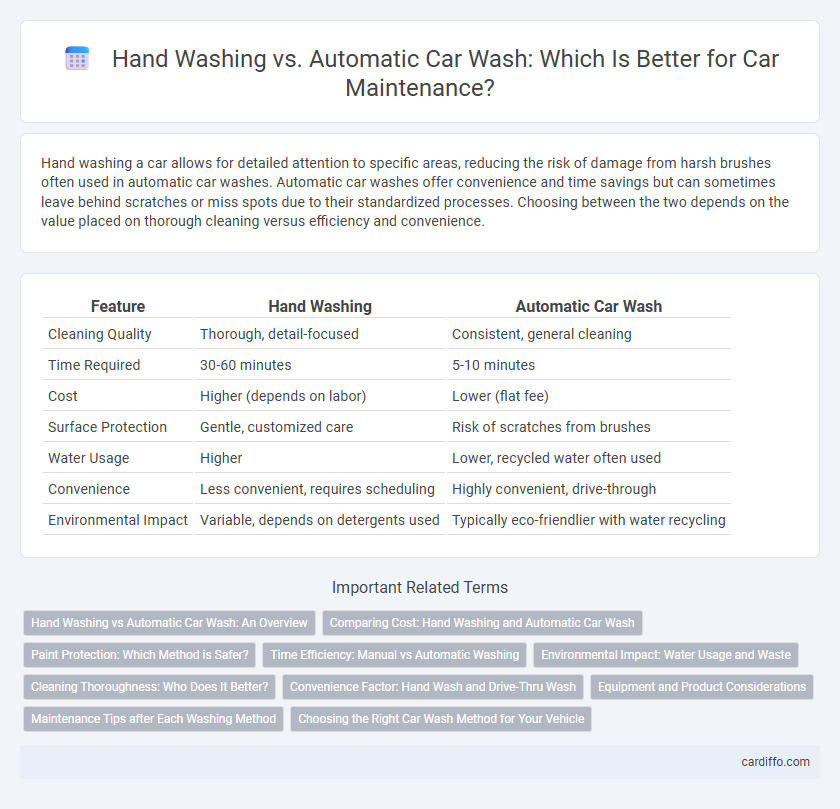Hand washing a car allows for detailed attention to specific areas, reducing the risk of damage from harsh brushes often used in automatic car washes. Automatic car washes offer convenience and time savings but can sometimes leave behind scratches or miss spots due to their standardized processes. Choosing between the two depends on the value placed on thorough cleaning versus efficiency and convenience.
Table of Comparison
| Feature | Hand Washing | Automatic Car Wash |
|---|---|---|
| Cleaning Quality | Thorough, detail-focused | Consistent, general cleaning |
| Time Required | 30-60 minutes | 5-10 minutes |
| Cost | Higher (depends on labor) | Lower (flat fee) |
| Surface Protection | Gentle, customized care | Risk of scratches from brushes |
| Water Usage | Higher | Lower, recycled water often used |
| Convenience | Less convenient, requires scheduling | Highly convenient, drive-through |
| Environmental Impact | Variable, depends on detergents used | Typically eco-friendlier with water recycling |
Hand Washing vs Automatic Car Wash: An Overview
Hand washing a car provides meticulous attention to detail, enabling the removal of stubborn dirt and reducing the risk of paint damage often caused by automatic car washes. Automatic car washes offer convenience and speed, utilizing high-pressure jets and rotating brushes that efficiently clean the exterior but may lead to micro-scratches or wax removal. Choosing between hand washing and automatic car wash depends on priorities such as thoroughness, potential for surface damage, time investment, and protection of the vehicle's finish.
Comparing Cost: Hand Washing and Automatic Car Wash
Hand washing a car typically costs between $10 and $30 depending on location and supplies, while automatic car washes average $5 to $15 per wash, offering a more economical option for frequent cleaning. Hand washing involves higher labor and water usage, which can increase overall expenses, especially if done professionally. Automatic car washes use specialized equipment that reduces water consumption and labor costs, making them more cost-effective for maintaining vehicle appearance.
Paint Protection: Which Method is Safer?
Hand washing your vehicle using proper techniques and high-quality microfiber cloths significantly reduces the risk of paint scratches and swirl marks compared to automatic car washes, which often use abrasive brushes and recycled water. Automatic car washes may introduce contaminants and cause micro-abrasions, accelerating paint degradation over time. Regular hand washing with gentle, pH-balanced car shampoo provides superior paint protection by minimizing damage and maintaining the car's finish.
Time Efficiency: Manual vs Automatic Washing
Automatic car washes significantly reduce time spent on vehicle cleaning, typically completing a wash cycle in 4 to 7 minutes compared to 20 to 30 minutes for hand washing. High-pressure water jets and rotating brushes in automatic systems streamline dirt removal and rinsing processes, enhancing efficiency. Choosing automatic washing maximizes time savings while maintaining consistent cleaning quality.
Environmental Impact: Water Usage and Waste
Hand washing a vehicle typically uses between 50 to 100 gallons of water per wash, often resulting in runoff containing soap, dirt, and chemicals that can contaminate local waterways. Automatic car washes use high-pressure, recycled water systems that reduce water consumption to around 30 to 45 gallons per wash while effectively managing wastewater through filtration and proper disposal. Choosing automatic car washes significantly lowers water usage and minimizes environmental pollution compared to hand washing.
Cleaning Thoroughness: Who Does It Better?
Hand washing delivers superior cleaning thoroughness by targeting hard-to-reach areas and allowing careful inspection for dirt, grime, and contaminants. Automatic car washes use high-pressure jets and rotating brushes to clean quickly, but often miss intricate spots and may cause minor surface abrasions. Detailed hand washing removes stubborn residues and protects paint integrity, making it the preferred method for comprehensive vehicle maintenance.
Convenience Factor: Hand Wash and Drive-Thru Wash
Hand washing a car offers precise control over cleaning but demands significant time and physical effort, making it less convenient for busy schedules. Automatic drive-thru car washes provide a quick, efficient solution by completing the wash cycle in minutes with minimal user involvement. Consumers prioritizing speed and ease often prefer drive-thru systems, while hand washing suits those seeking detailed care and attention.
Equipment and Product Considerations
Manual hand washing requires specialized brushes, microfiber cloths, and pH-balanced soaps to prevent paint damage, while automatic car washes use automated brushes or high-pressure jets that may cause micro-scratches if not properly maintained. Hand washing allows precise control over cleaning agents and equipment, reducing the risk of abrasive damage compared to some automated systems reliant on standard detergent formulations. Selecting appropriate equipment and gentle, vehicle-safe cleaning products is crucial to preserving finish quality and paint longevity in both methods.
Maintenance Tips after Each Washing Method
After hand washing, promptly dry the vehicle using a microfiber towel to prevent water spots and apply a protective wax to maintain the paint's integrity. In contrast, automatic car washes require inspecting for scratches or swirl marks caused by harsh brushes, followed by applying a sealant to protect against chemical residues. Regularly maintaining the exterior with touch-up paint and polishing preserves the car's finish regardless of the washing method used.
Choosing the Right Car Wash Method for Your Vehicle
Choosing the right car wash method depends on your vehicle's finish and protection needs. Hand washing offers gentle cleaning ideal for delicate paint and minimizes the risk of scratches, while automatic car washes provide convenience and speed with consistent results. Evaluate factors such as frequency, environmental impact, and budget to maintain your vehicle's appearance and preserve its value effectively.
Hand Washing vs Automatic Car Wash Infographic

 cardiffo.com
cardiffo.com